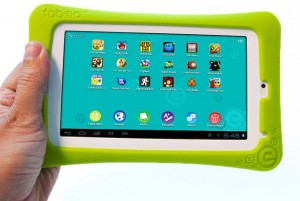The Web-based reader “StorEbook” has expanded on the idea of computers interacting with users via voice technology. During last week’s Foundry event, the audio book’s “voice synthesis engine” was demonstrated as it recited the classic tale “Goldilocks and the Three Bears.” The Web-based app, which uses AT&T’s Natural Voices, provides story characters with multiple voices, creating a new dynamic to the idea of “story time.” Continue reading New StorEbook Reader Uses Natural Voices to Tell Stories
By
Rob ScottFebruary 14, 2013
Jim Silver, editor in chief of timetoplaymag.com, estimates that more than 90 percent of the “so-called app toys that were trotted out last year sold poorly,” reports the Wall Street Journal. But toy companies are still trying to make it work, begging the question: “why have a hybrid, combining some aspect of a tablet with an actual physical toy or game, when a tablet alone will do?” Continue reading Sales of Physical Toys Impacted by Rise of Tablets and Apps
Continue reading Sales of Physical Toys Impacted by Rise of Tablets and Apps
By
emeadowsDecember 18, 2012
For around $200, parents can buy their kids child-appropriate tablet computers. According to The New York Times, children “understand that this single device is a million-channel TV, music collection, game machine, camera and e-book library, and a way to socialize with friends.” The article reviews 21 different kid-friendly tablets, including the $150 Android-powered Kurio 7, MEEP and Tabeo tablets. “The Nabi 2 costs a bit more ($200) but has a noticeably better screen,” suggests the article. “The Nabi Jr. ($100) is smaller and can double as a baby monitor.” Continue reading For the Cost of a Bicycle, Parents Can Purchase Kid-Friendly Tablets




